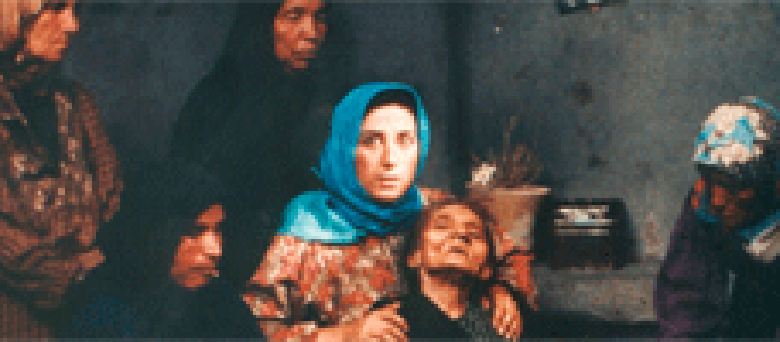Reviews
Rusari abi
Rakhshan Bani-Etemad
Iran, 1995
Credits
Review by Stephen Snart
Posted on 16 June 2008
Source 35mm print
Publicity for the British Film Institute’s recent retrospective on Iranian writer/director Rakhshan Bani-Etemad proclaims her to be the “first lady of Iranian film.” This is no overstatement. Throughout the course of the past twenty years, Bani-Etemad has achieved the kind of artistic success and popular appeal (at least domestically) that is not only unrivalled by any other Iranian female filmmaker but almost unparalleled by a contemporary female director working in any country. She began her career as a television reporter before becoming a filmmaker of both documentary and fiction films and sometimes something in-between: one of the defining qualities of her work is her penchant for blurring the lines between the two modes.
The Blue-veiled, her fifth feature-length film, is a beautiful tale of a suppressed love between a wealthy widower and a young factory worker. The widower, Rasul, makes an impressive living running a tomato factory but he is no corporate fat cat; in one of his first scenes we see him scolding his workers over the poor quality of a batch of tomatoes that they expect to sell to the public. This sort of benevolent appeal for the common good is what leads to his relationship with the rosy-cheeked and pertinacious Nobar, one of his new workers and a few decades his junior.
Nobar, who dons the bewitching blue veil from which the film’s title originates, may be bullheaded but she’s not self-pitying about her responsibility to care for her ill mother and two siblings. When Rasul learns of her dire conditions, he makes it his duty to amend her current situation by aligning a husband to alleviate her burden. After a few nonstarters, he risks the potential of social and familial scorn by proposing to her himself.
Rasul is operating with the best of intentions - and Nobar sees it as such as she happily accepts - but as much as the love that he feels for her is genuine, it seems to generate from paternal instinct more than lust. Rasul has three daughters from his marriage but they have all grown up and run their own families; not that this stops them from keeping in contact with him. In fact, it is their nosiness and concern that threatens to spell disaster for his burgeoning relationship with Nobar.
I have only seen a handful of Iranian films (all by Bani-Etemad, Abbas Kiarostami and Samira Makhmalbaf), and all of which are products of what is termed the Iranian New Wave. One of the dominant qualities of this cinema is its degree of self-reflexivity, often achieved through the blending of documentary and fiction (Under the Skin of the City, Close-Up) or through the acknowledgement of the cinematic apparatus (Taste of Cherry). The Blue-veiled is the first Iranian film I have seen without such overt self-reflexivity. Instead, the film is devoted to melodrama (a mode within Bani-Etemad’s films are often regarded), most clearly indicated through Ahmad Pezhman’s emphatic score which lays all emotions bare. There is also a number of narrative parallels to Douglas Sirk’s All that Heaven Allows, although Bani-Etemad is far too much of a visual realist to engage in the mise-en-scéne flourishes of Hollywood melodrama, opting for more subtle but just as symbolic production design.
Part of the pleasure I receive from viewing Iranian cinema is simply getting to see images of Iran that do not emanate from a news channel. From a ‘cinema of attractions’ standpoint, The Blue-veiled takes us on in-depth tours of the plantation, the mansion and the impoverished village. An understanding of the Iranian political climate and its religious laws will no doubt add to an appreciation of the film’s thematic weight. It will also help to understand the sort of government enforced visual restrictions that Bani-Etemad has to concede to—and to admire the ways she subverts them through symbolism and semiology. Nonetheless, such a background is not a prerequisite for viewing the film as the palpable emotion of the piece speaks for itself. Ezzatolah Entezami’s reticent performance as Rasul is an uncontainable wealth of passion, encapsulated perfectly by a scene late in the film: In a moment of duress, he tells Nobar, “I wish you had not come. I wish I had not seen you.” After a long pause and a sigh, the truth surfaces, “I wish you had come earlier.”
Bani-Etemad’s films need not be consumed just as curiosity pieces. They are the vivid product of a master filmmaker. Her immense skill is evinced by the breathtaking precision of the film’s penultimate shot framed between the gaps of a passing freight train and the devastating shot that follows, in which a geographical ambiguity suggests the contents of the preceding shot may not have been quite what they seemed.
We don’t do comments anymore, but you may contact us here or find us on Twitter or Facebook.



